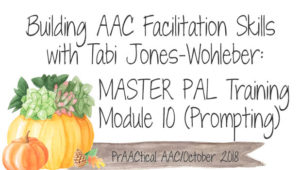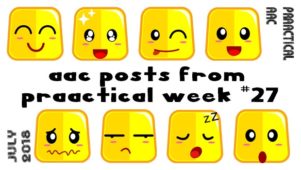5 Things to Consider About Prompts in Teaching AAC

When you’re learning something new, it’s likely that you’ll need some help along the way. The same is true for our AAC learners. Here are some of the things we’ve been thinking about lately regarding prompts and cues.
1. Sometimes, actually MANY times, a ‘perfect pause’ is all that’s needed. Stop the action, look expectantly at the learner, and wait quietly. How long? It depends on the individual and the situation, but 10 or 15  seconds is in the ballpark for most AAC learners.
seconds is in the ballpark for most AAC learners.
2. It’s important to consider both the type of prompt (e,g., gestural, verbal, physical) and how much information that prompt provides to the learner. We hear lots of SLPs say that they prefer verbal prompts because they are less helpful than, say a physical prompt, and, thus, require more from learner. Not always. Here’s an example: “Jason, tell me, ‘More milk.’” Vs. Gesturing over the message on the SGD. In that example, it’s the opposite. The verbal prompt makes it easier on the learner. If he doesn’t need that much help, we’d be better off using the gestural prompt.
3. Prompt hierarchies are essential elements of any clinical toolkit. Good SLPs use them fluently, moving fluidly up and down the hierarchy in response to the learner’s response. If you target one thing to strengthen, make it this.
4. Not sure where to start with prompt hierarchies? In general,
- Most-to-least for a new skill, device, or page set
- Least-to-most for an emerging skill that is inconsistent
5. In the hands of a skillful clinician, prompts can speed up the learning process. But, as soon as we begin using them, we should develop a plan to fade them so that the AAC learner becomes progressively more independent.
Filed under: PrAACtical Thinking
Tagged With: fading, intervention, prompt, prompt hierarchy
This post was written by Carole Zangari





2 Comments
http://ajslp.pubs.asha.org/article.aspx?articleid=2597618
Thanks, Kate!!